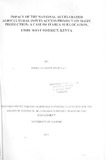| dc.description.abstract | Small holder maize production depends on access to agricultural inputs, extension services and information on production and markets. Production of maize in Kenya has been declining for the last two decades due to lack of access to improved seeds and fertilizers among other factors. This has resulted in low farm productivity, food insecurity and unavailability for many house holds in Kenya. The purpose of this study was to investigate the impact of the three components of the National Accelerated Agricultural Inputs Access Program on maize production in Itabua sub location of Embu West district and recommend .areas of improvement in future.
The objectives that form the basis of this study were to; assess the extent to which access to inputs impacted on maize production; examining level to which access to information on the programme impacted on maize production; examining the level to which access to extension services impacted on maize production. This study was a descriptive research limited to a population of 300 small holder farmers who were beneficiaries of the program in 2007 in Itabua sub location. A sample size of 30 farmers from this population was interviewed after systematic random sampling.
The research instruments used were a questionnaire consisting of structured and semi-structured questions and analysis with assistance of Statistical Package for Social Scientists. The findings are that the program, impacted on maize production increased to the extent that average maize yield improved by 24% from a mean of 2.7 bags per acre in 2006 to a mean of 3.3 bags per acre in 2007. In the season the project was implemented the percent of farmers who harvested less than 5 bags reduced from 26 (86.6%) in 2006 to 20(66.7%). On the other hand, the percent of those who harvested over 5 bags in 2006 more than doubled from 13.3% to 33.3% in 2007. The program also impacted positively on availability of maize as a food .The number of extra months maize as a food was available after harvesting increase for all 30(100%) of respondents.
However no family reported sale of surplus maize through groups hence they could not buy inputs as a group as was planned. From the findings, it was concluded that the three components of the program access to inputs, access to information and access to extension messages impacted positively to some extent in maize production in the short run. However, it did not have a long term impact on maize production. This is because harvests were not adequate for sale.
There were therefore no proceeds for subsequent purchase of inputs the next season as was planned. From the findings and conclusions, the researcher recommended that the government continues supporting inputs access programs and providing program information and extension messages through groups. The government should also link the groups to credit service providers and continue providing subsidized inputs through National Cereals and Produce Board stores. Farmers should explore crop inputs insurance schemes while researchers should carry out trials on use of EMCO maize variety that can be recycled. | en_US |

